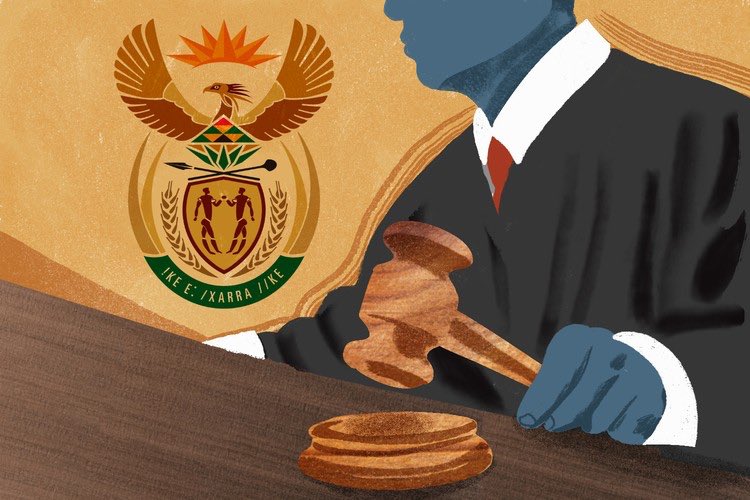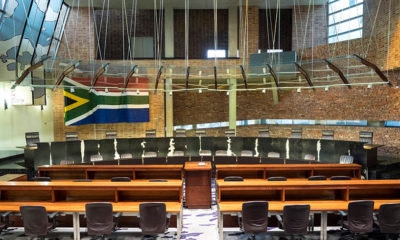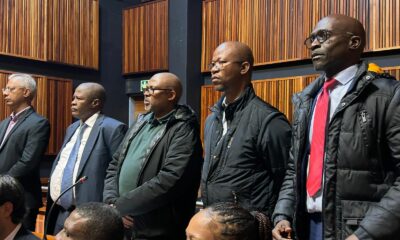News
South Africa’s High Courts Are Buckling: Judge Shortages Stall Justice and Shatter Lives

South Africa’s Justice System Is Buckling And Ordinary People Are Paying the Price
South Africa’s criminal justice system is edging into crisis not because of new laws or budget cuts, but because there simply aren’t enough judges to hear the growing mountain of criminal cases. From the Western Cape to the Eastern Cape and Gauteng, high courts are running on borrowed time and borrowed judges.
The consequences? Murder trials delayed for years, families stuck in grief limbo, and suspects, guilty or not living in legal no man’s land.
Trials Delayed, Lives Suspended
One of the clearest examples of the toll is the murder case of Vicki Terblanche, whose killing shocked Gqeberha in 2021. Her estranged husband, businessman Arnold Terblanche, accused of plotting her death, is out on R1 million bail. His trial was meant to begin on October 7 in the Gqeberha High Court.
Instead? It’s been bumped to March 2026.
Meanwhile, two other men Vicki’s then-boyfriend, Reinhardt Leach, and accomplice Dylan Cullis have already been sentenced to 25 and 18 years. But the alleged mastermind must now wait another year and a half for his day in court.
His lawyer, Alwyn Griebenow, summed it up plainly: the trial was postponed because no judge was available.
How Bad Is the Shortage?
Official figures show just how stretched the system has become:
Gauteng
-
Permanent judges: 65
-
Acting judges: More than 130
-
Pretoria: 53
-
Johannesburg: 78
This is the country’s busiest division and it’s running on temps.
-
Western Cape
-
Permanent judges: 28
-
Acting judges: 5
-
Vacancies: 5
Eastern Cape
-
Total judges: 31
-
26 permanent
-
4 acting
-
1 additional acting judge expected
-
-
Seats: Bhisho, Mthatha, Gqeberha and Makhanda (main seat)
Some trials are already being rolled into 2026. In Gauteng, the criminal roll stretches into that year. In the Western Cape and Eastern Cape, courts are already filling slots up to late 2025.
Acting Judges Aren’t the Long-Term Fix
Acting judges are often appointed to plug the gaps, but even insiders are worried about continuity and consistency.
One prosecutor told IOL that constant judge rotation creates disruption: “Every time an acting judge left, another stepped in. It was difficult to maintain continuity.”
Cape Town defence attorney William Booth says some suspects languish in custody for almost a decade before they even get a trial date.
He warns that criminal courts are clogged with serious cases like murder and that postponements have become the norm. And while acting judges help, he says the public has no real idea how they’re appointed or why.
“We need specialists,” Booth insists. “You can’t have every surgeon doing every type of operation, the same goes for judges.”
He’s even suggested South Africa adopt a model like London’s Old Bailey, a court dedicated solely to serious criminal matters.
Justice Delayed And Almost Denied
Legal experts warn the current crisis doesn’t just delay trials, it undermines the rule of law.
Attorney Paul Roelofse says judges aren’t merely referees: “They are stewards of the rule of law. Behind every hour in court lies days of research, drafting and scrutiny.”
He warns the cracks are starting to widen:
-
Heavy caseloads
-
Minimal preparation time
-
Overstretched support staff
-
Incomplete files and late transcripts
-
Outdated courtroom infrastructure
When judges are stretched thin, everyone feels it from magistrates and prosecutors to rural circuit courts and citizens waiting for justice.
Government Response: Slow and Uneven
The Office of the Chief Justice (OCJ) says it’s aware of the crisis and has launched a national review with the justice ministry led by former Deputy Chief Justice Dikgang Moseneke to evaluate court capacity and distribution.
In the meantime, provinces are scrambling for stopgaps:
Western Cape:
A criminal “backlog project” is being rolled out from October to December 2025 using four more acting judges.
Eastern Cape:
An additional acting judge was brought in to handle the Terblanche matter and other criminal trials though the OCJ insists that the postponement wasn’t backlog-related.
Gauteng:
Courts rely heavily on acting appointments just to function.
The OCJ confirmed some posts remain unfilled, including five in the Western Cape and four in the Eastern Cape. Vacancies and acting appointments are becoming more common than permanent staffing.
The Price of Delay
A recent OCJ report highlighted another red flag: 1,602 reserved judgments were sitting across South African courts as of August 2024.
-
223 (14%) have been outstanding for more than six months
-
Pretoria High Court leads with 246 reserved matters
-
Johannesburg Labour Court is close behind at 201
-
The Constitutional Court has the highest rate of six-month-plus delays
Meanwhile, magistrates’ courts, often the first stop for bail are also overwhelmed. Booth says bail hearings sometimes take “three or four months,” adding further pressure to overcrowded prisons and anxious families.
The Bigger Question
South Africans often say justice moves slowly, but now, in many places, it barely moves at all.
The shortage of judges isn’t just an administrative headache. It’s a constitutional crisis in slow motion. Victims wait for closure that never comes. Accused people wait for freedom or sentencing. Families wait in limbo.
And as one attorney put it, “When the system is stretched, the ripples hit everyone.”
Until the state fills those benches with the right people, courtrooms will continue to echo with postponements, not justice.
{Source: IOL}
Follow Joburg ETC on Facebook, Twitter , TikTok and Instagram
For more News in Johannesburg, visit joburgetc.com


























